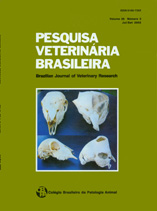 |
|
|
|
Year 2005 - Volume 25, Number 3
|

|
A infecção pelo vírus da Diarréia Viral Bovina (BVDV) no Brasil - histórico, situação atual e perspectivas, p.125-134
|
Flores E.F., Weiblen R., Vogel F.S.F., Roehe P.M., Alfieri A.A. & Pituco E.M. 2005. [Bovine viral diarrhea virus (BVDV) infection in Brazil: history, current situation and perspectives.] A infecção pelo vírus da Diarréia Viral Bovina (BVDV) no Brasil - histórico, situação atual e perspectivas. Pesquisa Veterinária Brasileira 25(3):125-134. Departamento de Medicina Veterinária Preventiva, Universidade Federal de Santa Maria, 97105-900 Santa Maria, RS, Brazil. E-mail: flores@ccr.ufsm.br
Bovine viral diarrhea virus (BVDV) is one of the most important pathogens of cattle worldwide. BVDV infection and associated diseases have been reported in Brazil since the late 1960ties. Several serological, virological, clinical and pathological reports demonstrate the widespread distribution of BVDV infection among Brazilian cattle. In addition to variable levels of positive serology in beef and dairy cattle, BVDV antibodies have been occasionally detected in swine, wild boars, goats, cervids and water buffaloes. BVDV infection has been diagnosed in aborted fetuses, buffy coats of persistently infected (PI) animals, clinical specimens from animals suffering from different clinical syndromes, semen of bulls of artificial insemination (AI) centers, in healthy fetuses and in commercial fetal bovine serum and/or cultured cells. About 50 isolates have been genetically and/or antigenically characterized up to date, whilst roughly an equivalent number of isolates awaits characterization. Most of the characterized isolates belong to BVDV-1 genotype, non-cytopathic (NCP) biotype, yet some BVDV-2 (and some CP BVDV) have been identified as well. Brazilian BVDV isolates display a high antigenic variability and are markedly different from North American vaccine strains. A few inactivated, polyvalent vaccines are currently licensed in the country, yet vaccination is still incipient in many regions: only about 2.5 million doses were marketed in 2003. The low serological cross-reactivity between vaccine strains and field isolates has recently stimulated national industries to develop vaccines containing Brazilian BVDV-1 and BVDV-2 strains. The overall knowledge about BVDV infection in Brazil has grown considerably in the last years, due to an increasing number of laboratories performing diagnosis and research. Studies on the pathogenesis, serological and molecular epidemiology and production of reagents for diagnosis have contributed decisively for the recent growing knowledge on BVDV infections in the country. |
| |
|
|
| |
|
 |